‘Final battle’: Inquest told of delusional fixations of cop killer trio Gareth, Stacey and Nathaniel Train
A trio of fanatical cop killers were fixated on a “final battle” as part of their belief in the second coming of Christ, believing they were at war with police as soon as two officers entered their property.
The trio who gunned down two cops and a neighbour in a religiously-motivated terror attack were trying to recruit people to their “final battle”, believing the “end of times” were imminent and they were at war with police who entered the property.
Queensland Constables Matthew Arnold and Rachel McCrow were murdered a rural property in Wieambilla, west of Toowoomba, while attempting a welfare check for Nathaniel Train, who was suspected of living his brother Gareth and his wife Stacey.
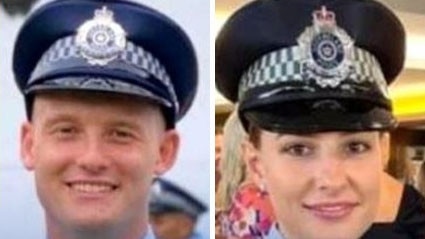
Moments after the two officers arrived at the property with constables Randall Kirk and Keely Brough on December 12, 2022, the Train family fired at the officers, instantly killing constable Arnold.
Constable McCrow was killed minutes later, while constables Kirk and Brough were able to escape the property.
Alan Dare, who lived near the Trains, had spotted a fire coming from their property and was fatally shot when he came to investigate.
The mammoth coronial inquest continued in Brisbane Magistrates Court on Tuesday, with Deakin University associate professor of politics, Josh Roose, stating that after examining 2500 primary resources, including emails, diary entries and interviews with people who knew the Trains, he believed the trio had become radicalised.
Professor Roose said Gareth’s radicalisation, although gradual, had gained momentum in July 2021, after he began communicating online with a man in the United States named Donald Day Jr.
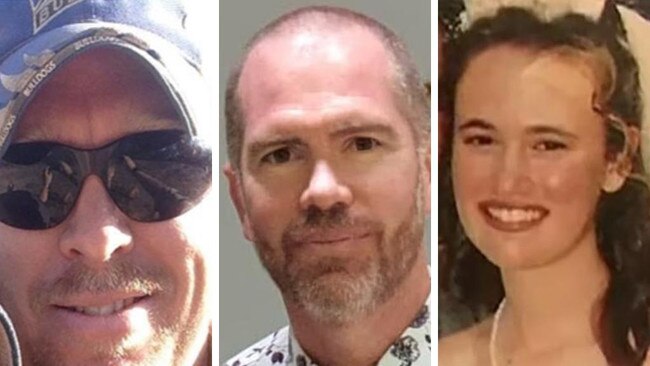
The inquest had previously been told that the trio had been carrying out the belief system of premillennialism – a Christian extremist ideology that relates to the second coming of Jesus Christ after the destruction of the world.
The ‘end of times’
While Professor Roose said he can’t speak to the mental health of the Trains, who had been experiencing a shared persecutory delusion stemming from Gareth’s beliefs, he could find evidence the trio had believed they were preparing for the “end of times”.
He said this “end of times” discussion was exacerbated once Gareth – and later Stacey – started interacting with Mr Day through their online discussions.
Stacey had been keeping a diary in the months leading up to December 12, where Professor Roose said he’d found evidence of her trying to calculate the “end of times” – which she estimated was about April or May 2023.
According to the Trains, these “end of times” would be brought on by various world events, including the pandemic.
Professor Roose said their innate hatred of police also fed into their belief that “state actors” would be coming for them and they might defend themselves if that ever occurred.
“I think they were in a period of waiting, they were expecting the end times,” he said.
“The moment that threshold was crossed, they were at war and they considered themselves to be in a battle with demons.”

Stacey had written to Mr Day about the crossing of the “Rubicon”, which is a reference to the river where Julius Caesar declared civil war that led to the downfall of the Roman Republic.
The inquest was told the Trains had named their front gate the “Rubicon”.
Professor Roose said that in his opinion, the minute the police jumped the Wains Rd property front gate, the Trains believed that they were now at war with those “demons”.
Professor Roose said he found their actions that day and in the months prior where they’d tried to recruit others to join their cause constituted a terrorist act, regardless of their mental state on December 12. “There’s a clear attempt to intimidate and threaten police in that overarching framework (by Gareth’s online videos),” Professor Roose said.
“(The December 12 incident) was not sophisticated. This was not an organised terrorist organisation.
“They were not a multinational organisation.
“But they had a transnational influence and transnational link to (Mr Day).
“They were actively seeking, actively preparing for battle.
“Their battle had arrived. They didn’t have a set precise end time but they were prepared for it.
“When the ‘Rubicon’ was crossed, in an metaphorical sense, there was a clear delineation (in their minds) – ‘you cross that, we’re at war’.”
Hours after they murdered the two officers and their neighbour, Gareth and Stacey had uploaded a video to a now deleted YouTube account detailing how they killed the “devils and demons”.
Professor Roose said the Trains “consistent preparation of an ambush site”, by way of building barricades and arming themselves on their property while they waited for “public state actors” was an “inherently offensive act”.
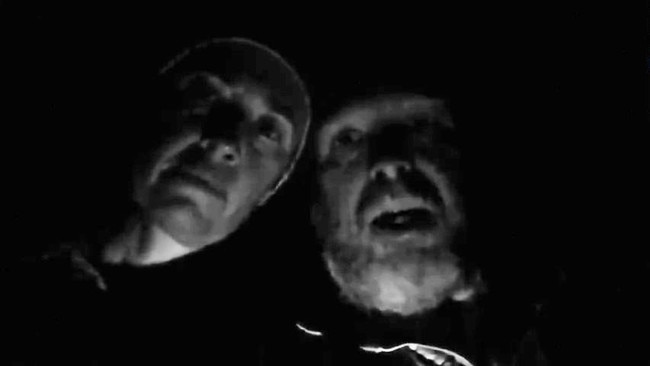
“They were seeking to kill and the facts are they did and they harmed others,” he said.
Professor Roose said combining all those factors, including their beliefs, was the definition of an act of terrorism.
He said Gareth and Stacey had even tried to recruit several people to join their cause in the months prior to December 12.
He referenced a video made by a woman overseas where she talked about sacrifice and the loss of loved ones.
“They’d written an email to her encouraging her to join them on the property as they prepared for end times,” Professor Roose said.
“That can be understood as an attempt to recruit someone to join them for this final battle.”
The inquest was told Stacey had also posted videos in the lead up to the shooting that Professor Roose referred to as her “recruitment videos”.
“They were uploaded but didn’t reach more than a couple of dozen people,” he said.
“(She was) talking about the end times (and) the importance of repentance and coming over.”
The radicalisation of the Trains
While he added he accepted that the Trains were likely experiencing a shared delusion that was not based in reality, their actions based on their beliefs were the definition of an act of terrorism.
“It’s possible for radicalised minded people to be dragged further and further down the rabbit hole,” he said.
“My opinion is they had an religious ideological motivation.
“On the morning (of December 12), they were already at that point effectively waiting.
“They didn’t know if, when, or how police would approach that property.
“I don’t believe they lured police to the property but I do believe they were waiting.
“The ‘Rubicon’ is a religious ideological frame … and once they (the police) cross that threshold they were at war.”
The inquest previously was told Gareth had a persecutory delusion disorder, which Stacey and Nathaniel later adopted as their delusions expanded.
However, Professor Roose said he didn’t believe these delusions fully played a distinctive role into Gareth’s decision to connect with what Mr Day was saying online.
“I understand it slightly differently, I don’t think he felt persecuted per say, through my framing, I think he thought the world was corrupt, powerful actors were behind the scenes pulling the strings and the had a role to play in combating that,” Professor Roose said.
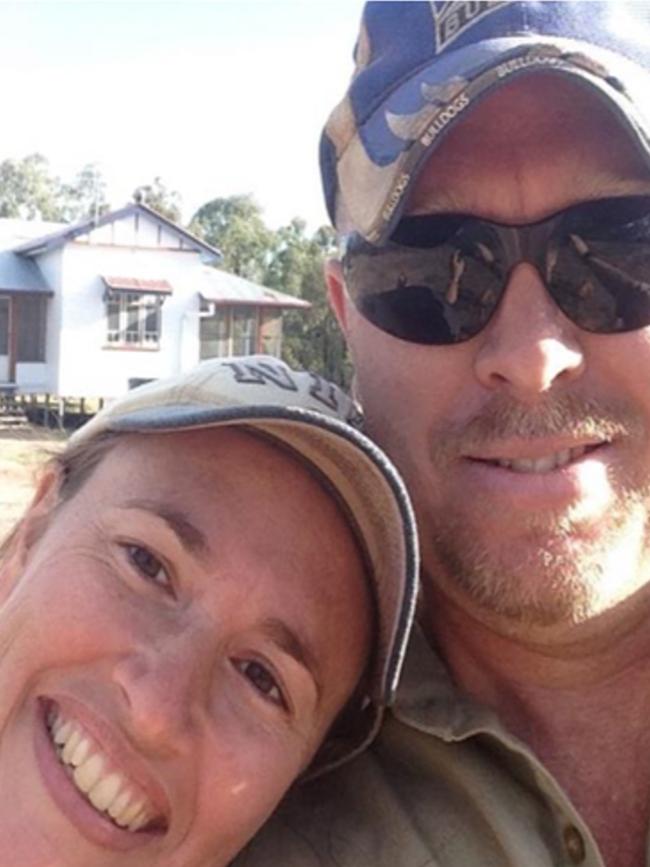
He added that the Trains beliefs became heavily influenced through their interactions with Mr Day and his beliefs.
“It’s critical to understand that in the early period from January 2021, Gareth’s framing of Christianity was very different to how he frames it later,” Professor Roose said.
“For me, in all the material that I’ve reviewed, that is the key moment in which he found what he is looking for that tied into his (Christian) upbringing, tied up to his Baptist end times belief system and he was engaged almost as an equal with Donald Day Junior.
“(Gareth) very quickly introduced Stacy into this space and you see Stacey started to engage in these ideas.”
Professor Roose said the Trains began planning for the end of times between August 2021 to October 2022.
“This is what Gareth has been looking for,” he said.
“They were starting to bunker down, they truly believed they were approaching the end of times battle.”
Nathaniel’s heart attack
While Nathaniel had been in contact with his brother throughout the years, including interactions in early January 2021, Professor Roose said it wasn’t until after his cardiac arrest in August 2021 that he really started to engage in Gareth and Stacey’s beliefs about the “end of times”.
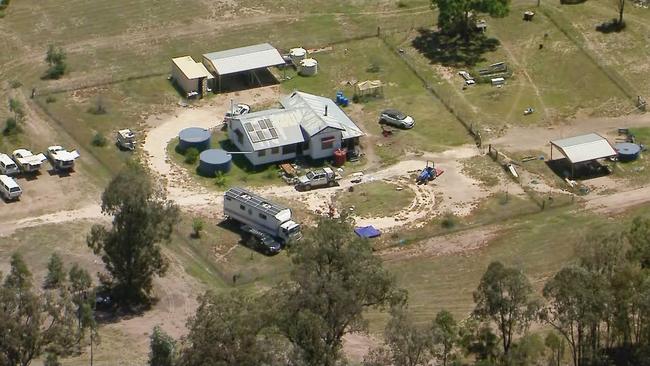
Earlier on Tuesday, Professor Christian Gericke, a consultant neurologist with 25 years of specialist experience, told the inquest on there was no evidence to suggest Nathaniel’s cardiac arrest caused an enduring brain injury or had any lasting effect on his cognitive abilities.
“There was positive evidence he did not have it (a brain injury),” Professor Gericke said.
“He had a shortened nervous systems afterwards … which is completely normal … but after that all his neurology normalised very quickly.”
Professor Gericke said he was able to examine Nathaniel’s CT scan following his August 2021 medical episode, but would have liked to have seen a MRI scan – which was not done at the time – to provide a better picture of his cognitive function.
“Cardiac arrest stops blood supply to the brain and can cause enduring, lasting damage,” he said.
“So we have very good evidence that he didn’t suffer from this.
“Nathaniel Train suffered from a cognitive impairment with short term memory deficits.”
A Specialised Emergency Response Team later fatally shot all three Train members after a lengthy siege at the Wieambilla property.
The inquest continues on Thursday.



